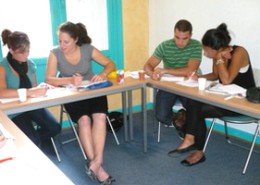Cactus Worldwide Blog:
written by Language Experts
If you’re looking for advice, knowledge and inspiration in learning a language from language experts, you’ve come to the right place.
The Cactus Worldwide Blog writers and language experts draw from our years of experience in learning and teaching languages to bring you academic tips, essential vocabulary, travel recommendations, first-hand reviews and much more related to the world of language learning in order to help you reach your goals. Our language experts have learnt many things along the way, not just languages, and on this blog they share their experience with you.
If you have a language learning query that you can’t find the answer to, please get in contact with us either by Facebook or Twitter or contact us here.
Latest Posts
 https://www.cactusworldwide.com/blog/wp-content/uploads/2014/11/rio.jpg
159
203
Sarah Watkins
Sarah Watkins2015-12-14 10:15:402015-12-15 15:12:30Our top 5 locations for winter sunshine
https://www.cactusworldwide.com/blog/wp-content/uploads/2014/11/rio.jpg
159
203
Sarah Watkins
Sarah Watkins2015-12-14 10:15:402015-12-15 15:12:30Our top 5 locations for winter sunshine https://www.cactusworldwide.com/blog/wp-content/uploads/2013/10/south_america_panoramic.jpg
157
430
Sarah Watkins
Sarah Watkins2015-11-20 15:28:182015-12-15 16:35:08Our top 6 locations in South America this winter
https://www.cactusworldwide.com/blog/wp-content/uploads/2013/10/south_america_panoramic.jpg
157
430
Sarah Watkins
Sarah Watkins2015-11-20 15:28:182015-12-15 16:35:08Our top 6 locations in South America this winter https://www.cactusworldwide.com/blog/wp-content/uploads/2015/11/Makkie.jpg
250
200
Fay Drewry
Fay Drewry2015-11-13 12:22:182015-11-16 11:47:25Teacher Development Workshop with Guest Speaker
https://www.cactusworldwide.com/blog/wp-content/uploads/2015/11/Makkie.jpg
250
200
Fay Drewry
Fay Drewry2015-11-13 12:22:182015-11-16 11:47:25Teacher Development Workshop with Guest Speaker
Does the UK have the Language Skills to Succeed?
 https://www.cactusworldwide.com/blog/wp-content/uploads/2015/10/451010596_3ce587d151.jpg
337
500
Sarah Watkins
Sarah Watkins2015-10-27 16:49:052015-11-20 09:44:09Win a TEFL Course in London or Bogota!
https://www.cactusworldwide.com/blog/wp-content/uploads/2015/10/451010596_3ce587d151.jpg
337
500
Sarah Watkins
Sarah Watkins2015-10-27 16:49:052015-11-20 09:44:09Win a TEFL Course in London or Bogota! https://www.cactusworldwide.com/blog/wp-content/uploads/2011/09/day-of-the-dead.jpg
151
203
Sarah Watkins
Sarah Watkins2015-10-27 14:29:132015-11-24 21:05:35Day of the Dead in Mexico: a time to celebrate
https://www.cactusworldwide.com/blog/wp-content/uploads/2011/09/day-of-the-dead.jpg
151
203
Sarah Watkins
Sarah Watkins2015-10-27 14:29:132015-11-24 21:05:35Day of the Dead in Mexico: a time to celebrate https://www.cactusworldwide.com/blog/wp-content/uploads/2015/10/map_route.jpg
930
620
Fay Drewry
Fay Drewry2015-10-27 12:30:182015-11-24 21:10:57Experience Le Tour de France 2016
https://www.cactusworldwide.com/blog/wp-content/uploads/2015/10/map_route.jpg
930
620
Fay Drewry
Fay Drewry2015-10-27 12:30:182015-11-24 21:10:57Experience Le Tour de France 2016  https://www.cactusworldwide.com/blog/wp-content/uploads/2015/10/bigstock-Woman-with-headphones-chating-64565560-e1444738146588.jpg
400
600
Fay Drewry
Fay Drewry2015-10-13 12:04:482015-11-24 21:12:40Why Learn a Language Online?
https://www.cactusworldwide.com/blog/wp-content/uploads/2015/10/bigstock-Woman-with-headphones-chating-64565560-e1444738146588.jpg
400
600
Fay Drewry
Fay Drewry2015-10-13 12:04:482015-11-24 21:12:40Why Learn a Language Online?  https://www.cactusworldwide.com/blog/wp-content/uploads/2015/10/a-level-revision-courses.jpg
200
304
Sarah Watkins
Sarah Watkins2015-10-06 14:12:532015-11-24 21:23:18A Level Revision Courses in October Half Term
https://www.cactusworldwide.com/blog/wp-content/uploads/2015/10/a-level-revision-courses.jpg
200
304
Sarah Watkins
Sarah Watkins2015-10-06 14:12:532015-11-24 21:23:18A Level Revision Courses in October Half Term https://www.cactusworldwide.com/blog/wp-content/uploads/2015/10/teacher-training-courses.jpg
200
300
Sarah Watkins
Sarah Watkins2015-10-01 19:53:482015-11-24 21:29:35Teacher Training Courses: European Languages
https://www.cactusworldwide.com/blog/wp-content/uploads/2015/10/teacher-training-courses.jpg
200
300
Sarah Watkins
Sarah Watkins2015-10-01 19:53:482015-11-24 21:29:35Teacher Training Courses: European Languages https://www.cactusworldwide.com/blog/wp-content/uploads/2013/08/SFF-logo.jpg
151
203
Sarah Watkins
Sarah Watkins2015-10-01 13:56:262015-11-24 21:32:20Win a TEFL Course: Suzanne Furstner Scholarship 2016
https://www.cactusworldwide.com/blog/wp-content/uploads/2013/08/SFF-logo.jpg
151
203
Sarah Watkins
Sarah Watkins2015-10-01 13:56:262015-11-24 21:32:20Win a TEFL Course: Suzanne Furstner Scholarship 2016 https://www.cactusworldwide.com/blog/wp-content/uploads/2015/10/krakow-tefl.jpg
272
400
Sarah Watkins
Sarah Watkins2015-10-01 10:24:372015-12-15 15:06:49TEFL Course Abroad: Learn the Language
https://www.cactusworldwide.com/blog/wp-content/uploads/2015/10/krakow-tefl.jpg
272
400
Sarah Watkins
Sarah Watkins2015-10-01 10:24:372015-12-15 15:06:49TEFL Course Abroad: Learn the Language https://www.cactusworldwide.com/blog/wp-content/uploads/2015/09/french-flag.jpg
173
261
Sarah Watkins
Sarah Watkins2015-09-29 14:44:202015-11-24 21:39:21Top 10 French Rugby Phrases
https://www.cactusworldwide.com/blog/wp-content/uploads/2015/09/french-flag.jpg
173
261
Sarah Watkins
Sarah Watkins2015-09-29 14:44:202015-11-24 21:39:21Top 10 French Rugby Phrases https://www.cactusworldwide.com/blog/wp-content/uploads/2015/09/Costa-Rica-horses-Samara.jpg
200
324
Laura Ellington
Laura Ellington2015-09-24 11:02:372020-05-26 10:53:23Living in Costa Rica: An Expat Story
https://www.cactusworldwide.com/blog/wp-content/uploads/2015/09/Costa-Rica-horses-Samara.jpg
200
324
Laura Ellington
Laura Ellington2015-09-24 11:02:372020-05-26 10:53:23Living in Costa Rica: An Expat Story https://www.cactusworldwide.com/blog/wp-content/uploads/2015/09/rugby_field.jpg
151
203
Sarah Watkins
Sarah Watkins2015-09-22 11:27:312015-11-24 22:10:23Rugby World Cup Host Cities – Learn English
https://www.cactusworldwide.com/blog/wp-content/uploads/2015/09/rugby_field.jpg
151
203
Sarah Watkins
Sarah Watkins2015-09-22 11:27:312015-11-24 22:10:23Rugby World Cup Host Cities – Learn English https://www.cactusworldwide.com/blog/wp-content/uploads/2015/08/children-learning-languages-small.jpg
151
204
Sarah Watkins
Sarah Watkins2015-09-15 13:02:392015-11-24 22:11:47Spanish Introductions: Help Your Child Introduce Himself
https://www.cactusworldwide.com/blog/wp-content/uploads/2015/08/children-learning-languages-small.jpg
151
204
Sarah Watkins
Sarah Watkins2015-09-15 13:02:392015-11-24 22:11:47Spanish Introductions: Help Your Child Introduce Himself